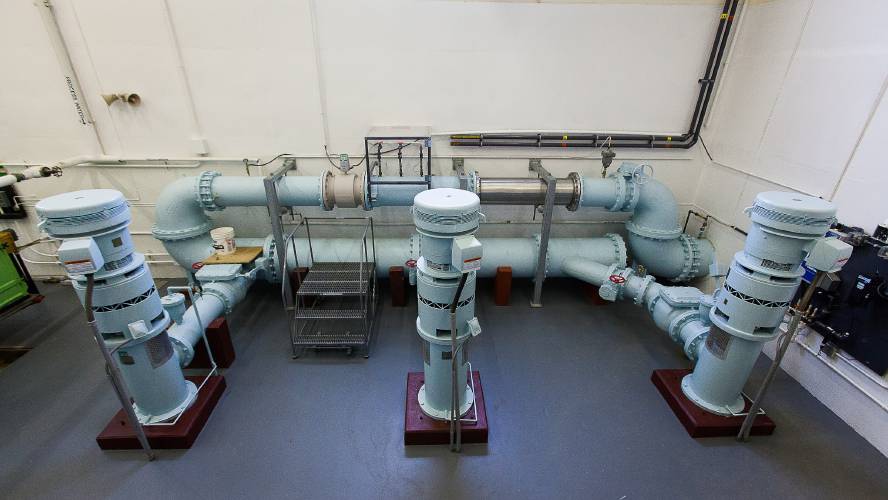Amid PFAS contamination concerns, Pembroke seeks water connection with Concord

Pumps move water from Lake Penacook to the water treatment facility in Concord as seen on Friday, Jan. 29, 2016. ELIZABETH FRANTZ
| Published: 02-25-2025 5:42 PM |
As Pembroke considers a potential partnership with Concord to reduce “forever chemical” contamination in its water, Concord leaders aren’t sure they want to share.
“The bottom line is that we want to make sure that any collaborative arrangement, or any water sharing or regional water agreement that we enter into, is in the best interest of the citizens of Concord and the water ratepayers,” said Concord Mayor Byron Champlin. “We want to be prudent about the use of our water resources.”
Concord has concerns about its supply of water, which is drawn from Penacook Lake. Last year, the city hit the brakes on a plan to sell water to the town of Bow while it undertook a study to evaluate its capacity – and desire – to connect with other communities.
Pembroke Water Works draws from three wells with a capacity of about 1 million gallons a day that provide water in Pembroke, Allenstown and a few homes in Hooksett. It detected PFAS or perfluoroalkyls, often called “forever chemicals,” in the water supply a few years ago.
Since then the town has been working on a plan while striving to keep contamination below acceptable levels. If Pembroke can connect its water to Concord’s, the system will be able to dilute its water while considering longer-term solutions.
At town meeting on Saturday, March 15, voters will decide whether to borrow $10.4 million from the state’s Department of Environmental Services to go forward with the connection with Concord. The bond includes $1.78 million in guaranteed grant money, which would not need to be paid back. An additional $1.35 million loan could also be forgiven, meaning the actual payback – by water users, not through property taxes – would be a little more than $7 million over 20 years.
Interconnection is the first step to addressing the town’sPFAS problem, said Kevin Brasley, chair of the five-member board that oversees Pembroke Water Works.
“Once we get the interconnection done, that will give us the time we need to get done everything else,” he said at a meeting last week. “With the interconnection, we’ll be blending our water with Concord’s, which will keep our numbers below the rates the government is issuing throughout the state. If we don’t do that, we run the risk of getting our wells shut down.”
Article continues after...
Yesterday's Most Read Articles
Concord’s water supply predominately comes from Penacook Lake, which is known locally as Long Pond, using the Contoocook River as a second option during times of drought, Champlin said. As the city grows, it eventually expects to draw water from the Merrimack River.
“One of the considerations is how much will any water sharing accelerate the timeframe for which we eventually have to supplement the water that we have in Long Pond with water coming from the Merrimack,” Champlin said.
While Pembroke voters will be asked to approve the money for the interconnection, Concord has not yet agreed to the plan. The two municipalities intend to meet to discuss the issue at hand.
Pembroke Water Works superintendent Matthew Gagne said the town doesn’t know how long these human-made chemicals have been in the water supply. The town first detected PFAS in 2016, right around the time testing was developed for these chemicals.
“They’ve been in use since the 1940s and have been put into everyday consumer items throughout the ‘50s and continued to expand,” Gagne said. “They were not regulated by EPA until around 2020, and even then it was New Hampshire that actually set the new standards.”
The new standards led to more water sources being flagged. In 2021, Pembroke conducted a study to explore options, with the Concord interconnection proving to be the cheapest path forward.
Pe mbroke’s town meeting will be held on Saturday, March 15 at 9 a.m. at Pembroke Academy.
Rachel Wachman can be reached at rwachman@cmonitor.com







 Man dies in RV fire in parking lot of Concord’s Steeplegate Mall
Man dies in RV fire in parking lot of Concord’s Steeplegate Mall Outside, please: Concord outdoor dining begins for the season
Outside, please: Concord outdoor dining begins for the season ‘A full board’: After frustration, Chichester appoints a third selectman
‘A full board’: After frustration, Chichester appoints a third selectman Patriot Piecemakers craft quilts to honor veterans
Patriot Piecemakers craft quilts to honor veterans
